Ernest Hemingway, one of the most compelling journalists of the twentieth 100 years, is known for his unmistakable composing style — straightforward, direct, and frequently meager. His works, like The Elderly Person and the Ocean, A Goodbye to Arms, and For Whom the Ringer Rings, have left an enduring heritage in the realm of writing. Hemingway’s composing frequently investigates subjects of boldness, misfortune, love, and the human condition, mirroring his own courageous life and encounters as a fighter, columnist, and explorer.
His capacity to convey significant feelings with moderate writing has made his statements ageless and effective. Hemingway’s words resound profoundly, catching both the excellence and the battle of life. Whether examining the idea of war, love, or the quest for significance, his statements offer knowledge of the intricacies of the human soul. The following is a portion of his most paramount statements, each repeating the force of straightforwardness and truth.
Life and Death
Hemingway’s writing often explored themes of existentialism, the human condition, and the inevitability of death. His works reflect his belief in the importance of living authentically, even in the face of suffering.
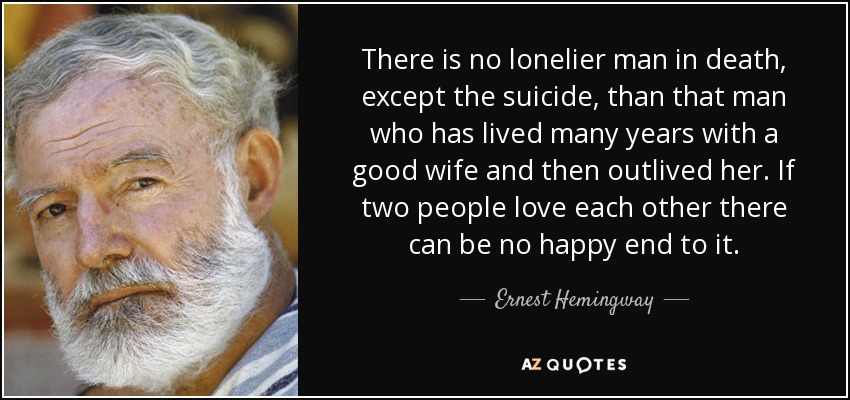
- “Courage is grace under pressure.”
- “The world breaks everyone, and afterward, some are strong in the broken places.”
- “In order to write about life, first you must live it.”
- “The only thing that can spoil a day is people. People are just too much, and they can ruin everything.”
- “The world is a fine place and worth fighting for, and I hate leaving it very much.”
- “Death is the greatest thing that can happen to a man. It is the one thing that makes us all equal.”
Writing and the Craft of Writing
Hemingway’s approach to writing was minimalist, favoring simple, direct language. His famous “Iceberg Theory” suggested that much of the meaning in a story lies beneath the surface, with the writer choosing to reveal only the essential elements.
- “There is no friend as loyal as a book.”
- “All you have to do is write one true sentence. Write the truest sentence that you know.”
- “The best way to find out if you can trust somebody is to trust them.”
- “I write one page of masterpiece to ninety-one pages of shit. I try to put the shit in the wastebasket.”
- “A man’s got to take a lot of punishment to write a hilarious book.”
- “It is not hard to write. It is hard not to write.”
- “I love to write. I love to write. I love to write.”
- “Prose is architecture, not interior decoration, and the Baroque is over.”
War and Conflict
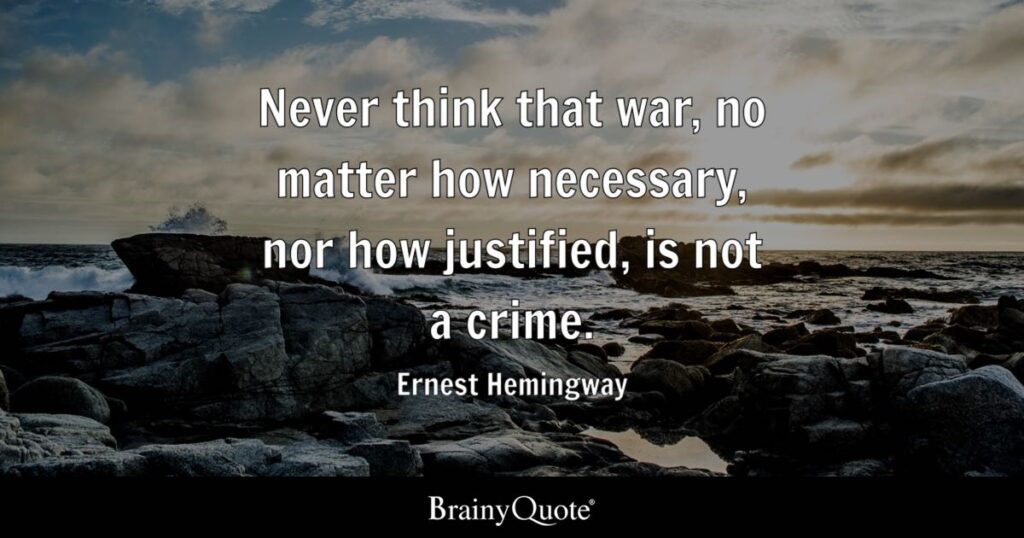
- “Never think that war, no matter how necessary, nor how justified, is not a crime.”
- “There is no friend as loyal as a book.”
- “The most essential gift for a good writer is a built-in, shockproof shit detector.”
- “War is hell, but it’s a hell that’s not without its moments of glory.”
- “The war is not over until you come back.”
- “I’ve never been afraid of dying. I’ve been afraid of not trying.”
- “We are all soldiers in a war, and the world is the battlefield.”
- “In war, there are no unwounded soldiers.”
Love and Relationships
His tumultuous relationships and marriages often shaped Hemingway’s views on love. His writing reflects both the beauty and pain that love can bring, usually highlighting the complexity and fragility of human connection.
- “There is no friend as loyal as a book.”
- “The only thing that can spoil a day is people.”
- “Love is a thing that is always in the air. It’s something that can’t be controlled, only felt.”
- “I love you, but I don’t know if I can live with you.”
- “The greatest thing in life is to be loved, and the greatest thing in love is to be loved by the right person.”
- “Love is the thing that keeps you going when everything else falls apart.”
- “I never had a friend who had a love life that was worth talking about.”
- “Love is the only thing that can make you feel alive.”
Nature and the Outdoors
Hemingway had a deep appreciation for nature, and his writing often reflects his love for his experiences in nature provided much inspiration for his work.
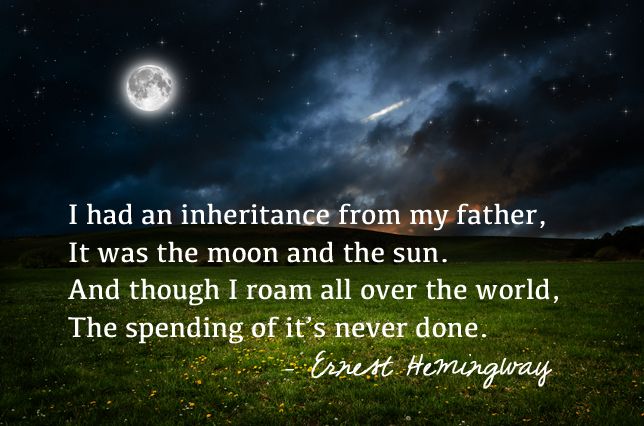
- “The sea is the same as it has been since before men ever sailed on it, and it is the same as it will be when men are gone.”
- “The mountains are calling, and I must go.”
- “I am not a fisherman. I am a fisherman’s apprentice.”
- “In the wild, there are no rules.”
- “The wild is a place where we are most free, and it is where we find our truest selves.”
- “The outdoors is the best teacher you will ever have.”
- “Nature is the one thing that never betrays you.”
- “There is no friend as loyal as a book.”
Happiness and Fulfillment
Hemingway’s reflections on happiness often convey a sense of fleeting joy and the importance of living in the moment. His characters frequently search for meaning in their lives, usually finding solace in simple pleasures or moments of connection.
- “Happiness in intelligent people is the rarest thing I know.”
- “There is no friend as loyal as a book.”
- “The best way to find out if you can trust somebody is to trust them.”
- “I have learned to be happy with what I have, and I have learned to enjoy the little things in life.”
- “The greatest thing in life is to be loved, and the greatest thing in love is to be loved by the right person.”
- “A man can be destroyed but not defeated.”
- “The happiest people I know are the ones who are the most grateful for what they have.”
- “The key to happiness is living without regret.”
Masculinity and Strength
Hemingway’s exploration of masculinity often revolves around themes of physical strength, emotional resilience, and the ability to endure hardship. His male protagonists are frequently depicted as stoic, brave, and capable of confronting the challenges life throws at them.
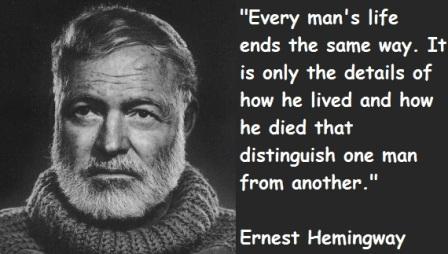
- “A man can be destroyed but not defeated.”
- “Courage is grace under pressure.”
- “A man’s got to take a lot of punishment to write a hilarious book.”
- “The only thing that can spoil a day is people.”
- “There is no friend as loyal as a book.”
- “A man who has nothing to do is a man who is dangerous.”
- “There is no greater thing than to be a man who has lived a life of honor.”
- “The number of women does not make a man he’s been with, but by the number of things he has done.”
- “A man must always keep his head when the world is falling apart around him.”
The Human Condition
Hemingway’s exploration of the human condition often delves into the themes of suffering, resilience, and the search for meaning in a chaotic world. His characters are usually depicted as struggling to find purpose in a world that seems indifferent to their struggles.
- “Man is not made for defeat. A man can be destroyed but not defeated.”
- “There is no friend as loyal as a book.”
- “In the end, we are all just stories.”
- “The world is a fine place and worth fighting for, and I hate to leave it very much.”
- “We are all apprentices in a craft where no one ever becomes a master.”
- “It is not hard to write. It is hard not to write.”
- “The greatest thing in life is to be loved, and the greatest thing in love is to be loved by the right person.”
- “Life is a game, and the game is played for keeps.”
Adventure and the Pursuit of Meaning
- “It is good to have an end to journey toward, but it is the journey that matters, in the end.”
- “I never had a friend who had a love life that was worth talking about.”
- “The wild is a place where we are most free, and it is where we find our truest selves.”
- “Adventure is worthwhile in itself.”
- “The sea is the same as it has been since before men ever sailed on it, and it is the same as it will be when men are gone.”
- “I am not a fisherman. I am a fisherman’s apprentice.”
- “There is nothing to writing. All you do is sit down at a typewriter and bleed.”
Loneliness and Isolation
Hemingway’s writing often explores the theme of loneliness. Many of his characters struggle with isolation, either physically or emotionally. His work suggests that loneliness can be both a source of pain and a means of self-discovery.
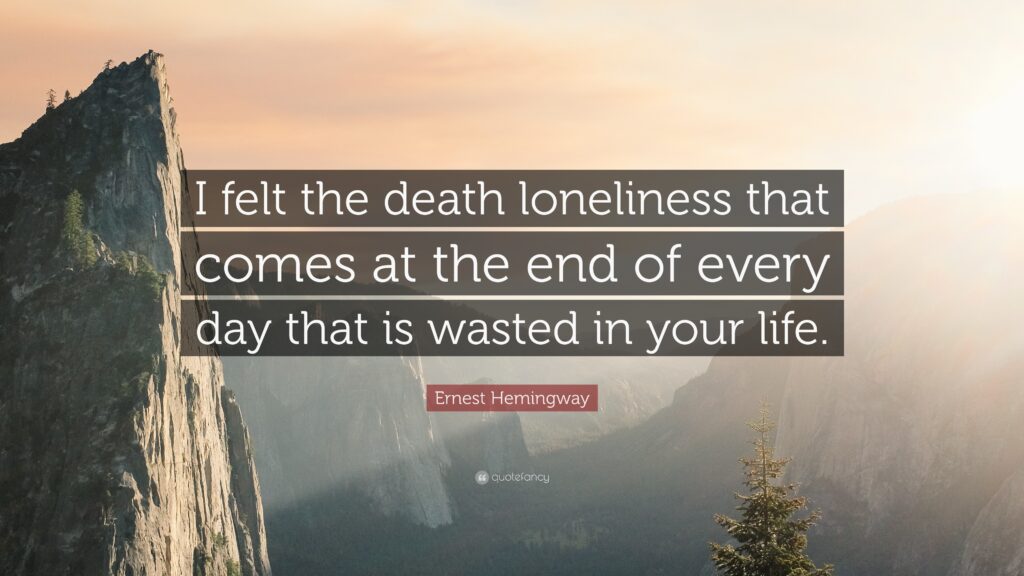
- “There is no friend as loyal as a book.”
- “I am not a fisherman. I am a fisherman’s apprentice.”
- “Loneliness is not a thing that can be fixed. It is something that must be lived with.”
- “We are all apprentices in a craft where no one ever becomes a master.”
- “The only thing that can spoil a day is people.”
- “I never had a friend who had a love life that was worth talking about.”
- “Loneliness is the ultimate form of freedom.”
Frequently Asked Questions
What is Ernest Hemingway’s composing style?
Hemingway is known for his brief, moderate composing style, frequently called the “Icy mass Hypothesis.” He put stock in showing as opposed to telling, leaving a lot of implied underneath the surface.
What topics are discussed every day in Hemingway’s work?
Hemingway frequently investigated topics of affection, war, misfortune, boldness, and the human battle for significance.
How did Hemingway see life?
Hemingway considered life to be a fight to persevere and track down magnificence, frequently stressing versatility notwithstanding difficulty.
Did Hemingway expound on his encounters?
Indeed, quite a bit of Hemingway’s composing was prompted by his own life, including his encounters with the Second Great War and his work as a columnist.
What effect did Hemingway have on writing?
Hemingway influenced contemporary composition, affecting endless creators with his unique style and investigation of profound topics.
How did Hemingway’s own life influence his composition?
Hemingway’s brave life, loaded with individual battles and worldwide encounters, profoundly impacted the topics and characters in his works.
What makes Hemingway’s statements essential?
His statements are significant due to their straightforwardness, profundity, and reflection on widespread human encounters.
Conclusion
Ernest Hemingway’s composition remains resounding because of its crude genuineness and profound comprehension of the human experience. His statements mirror his way of thinking about solidarity, flexibility, and the intricacies of life. Through his moderate yet vigorous composition, Hemingway captured the embodiment of battle, love, and mental fortitude, abandoning a heritage that perseveres in both writing and mainstream society. His words are tokens of the getting through force of straightforwardness and the significance of embracing life’s difficulties.
